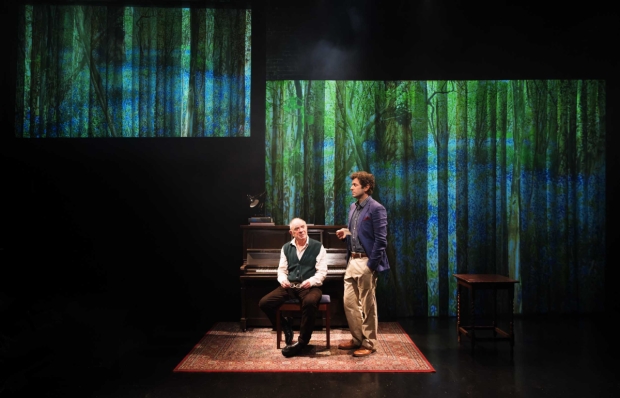We Started to Sing at the Arcola Theatre – review

© Alex Brenner
Award-winning writer Barney Norris eulogises and examines his family history in this unusual new play. On paper, given Norris's credentials and the fact that his searing 2014 piece Visitors was a major success for this venue, We Started To Sing would appear to be a fitting choice to reopen a rejuvenated, post-pandemic Arcola main house. Unfortunately, in practise, it's a frustratingly uneven text, lacking focus, dramatic propulsion and, for the first half at least, much real interest unless you are actually a member of Barney Norris's family, in which case it's probably fascinating, or at least relatable.
For the rest of us though, it may prove a bit of a slog, as Norris painstakingly recreates not especially dramatic moments from 30 years of family events. If the second half works better it's because it focuses primarily on the physical and mental decline of Norris's grandparents (played with consummate skill, delicacy and truth by Barbara Flynn and Robin Soans) and the challenges of getting older are something that most of us will face, assuming we're lucky enough to make it that far. Flynn and Soans beautifully convey decades of shared experience and mutual adoration, respect and occasional frustration, in a masterclass of understated acting, subtly shading in the decline into confusion and infirmity. By contrast, the trio of younger actors portraying Norris's parents and stepfather barely seem to age at all, which might prove confusing if you're not listening to the script carefully.
Frankly, whether said script is even worth listening to is questionable: the attention to detail of the minutiae of these people's privileged lives is remarkable I suppose, but there are only so many conversations about having butter on panettone or whether the washing up's been done or how much firewood is required to heat a house from a wood-burning stove that you can listen in on before feeling like your brain might melt, and it doesn't help that Norris has directed his own work at a pace that is not so much slow as stopped. There is a lot of "I remember when…" type speechifying as characters recall facts and incidents from their past, and that technique of constantly telling rather than showing becomes increasingly wearisome.
Soans does deliver a riveting monologue about old Bert's war memories however, and Flynn has such warmth and presence that even watching her silently tend to her wheelchair-bound husband carries real gravitas. Much of the blocking is terrible however, as though staged for a completely different space from this one with audience on three sides. Whole sections of the auditorium, particularly away from the central seating, will spend swathes of the all-too-static performance staring at the back of heads, plus the extensive use of projections (presumably from the Norris family archives) doesn't fully work if you're sitting at the sides.
David Ricardo-Pearce has some good moments as Norris's estranged father David, and he is a beautiful pianist: the play is infused with music and poetry throughout, and much of that is truly lovely. If Naomi Petersen and Rob Taylor don't generate much interest or conviction as Norris's mum and her subsequent husband, in their defence, they are saddled with some mind-bogglingly tedious dialogue. It all gets a bit bizarrely meta when David talks about Barney getting a directing job at the Bush Theatre and describes the play he's working on as "there are these people…they sit around. And then one of them dies. And that's it really…" which could equally apply to We Started To Sing.
In a somewhat defensive programme note, Norris states that he and his brother stopped talking for years over "the ethics of telling" and that he has some family members who would prefer him not to be telling these tales. One can't help feeling that a drama about those conflicts would prove more engaging and interesting than the flaccid, self-indulgent effort we have here. Despite some tartly accurate observations of family dynamics, less than two hours stage time have seldom felt so long. Disappointing.










